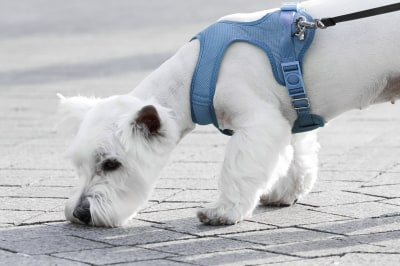Although a few extra pounds to snuggle might seem harmless, obesity in dogs is increasing and threatening our four-legged best friends' longevity. Today, we look at the issues involved with overweight dogs, and what owners can do to help their pups.
Obesity in Dogs
Obesity in dogs is a condition characterized by an excessive accumulation of body fat, leading to health issues such as joint problems, diabetes, and heart disease. It is important to monitor your dog's weight and ensure they are receiving a balanced diet and regular exercise to prevent obesity.
What can I do if my dog is overweight?
If you think that your canine companion may be overweight, it's time to head to the vet for a checkup. Your veterinarian will weigh your pooch, perform a thorough examination to determine your pup's overall health, then let you know if your dog is overweight based on their breed and build.
Carrying excess weight can be a contributing factor to many serious and painful conditions in dogs. This is why it's so important to help your dog maintain a healthy weight throughout their lifetime.
Consider Your Dog's Fitness Level
- Overweight dogs often pant even when walking relatively slowly, and may walk slower or need to take more naps than before.
Feel For Your Pup's Ribs
- If your pooch is a healthy weight, you should be able to feel their ribs without a thick layer of fat over them. Your dog's chest should be wider than their abdomen, and there will be a noticeable tuck-up from chest to stomach about where their waist should be (see illustration below).
Checkout Your Pooch's Figure
- Dogs that are overweight will generally have no visible waistline and no distinction between the chest and stomach when viewed side-on. See the illustration below to get a better understanding of how your dog should look from the side.
How can dogs become overweight?
Dogs can become overweight due to a combination of factors, including overfeeding, lack of exercise, and feeding high-calorie treats. Additionally, certain medical conditions, such as hypothyroidism or Cushing's disease, can also contribute to weight gain in dogs. It is important for dog owners to monitor their pet's diet and activity level to prevent obesity and maintain their overall health.
How can I help my dog lose weight?
Weight gain can be a symptom of a serious underlying illness, so if you think that your dog is overweight a trip to the vet is definitely called for. If your vet determines that your pup is overweight and there are no underlying illnesses causing the weight gain, they will recommend a diet and exercise plan to help get your pooch's weight back on track safely.
Here are a few things that your vet may recommend to help your four-legged friend shed those extra pounds.
Regular Exercise
- Keep to a regular exercise schedule for your dog, including going for walks twice a day and playtime outside once a day. Playing fetch or frisbee can help you and your dog to form a closer bond as well as provide your pup with a fun way to burn a few extra calories.
Diet & Feeding
- At Putnam North Animal Hospital, we offer nutritional consulting for dogs. During a nutritional consultation, our vets will assess your pet's calorie intake and suggest adjustments to promote weight loss or address specific health concerns. They may recommend incorporating supplements or additional foods into your pet's current diet to achieve these goals.
Yearly (or Twice-Yearly) Checkups
- Even when you're sure that there is nothing wrong with your dog, routine wellness exams are important. Annual or twice-yearly wellness exams give your vet the opportunity to monitor your pet's weight and spot the early signs of illness so that conditions can be treated before they become more serious.
If your dog begins following a weight loss plan, visit your vet for follow-up appointments so that your pet's progress can be monitored and dietary adjustments made if necessary
Note: The advice provided in this post is intended for informational purposes and does not constitute medical advice regarding pets. For an accurate diagnosis of your pet's condition, please make an appointment with your vet.




